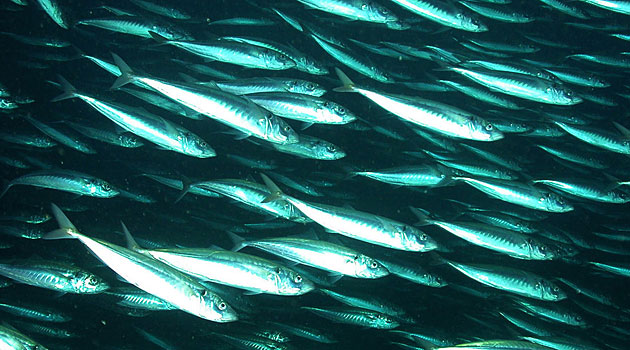Jack mackerel, devastated by years of free-for-all overfishing in the southern Pacific, now stands a strong chance of recovery with new legally binding measures to protect it, authorities who oversee the fishery told ICIJ.
The South Pacific Regional Fisheries Management Organization (SPRFMO) took on legally binding status last month after Chile ratified it in July. Its quotas and directives had been only voluntary for seven years.
A January exposé by ICIJ revealed that Asian, Latin American and European fleets had nearly decimated the jack mackerel stock while government officials dragged their feet to make fishing quotas mandatory.
“I’m very pleased despite the fact that jack mackerel has been hammered so hard,” Bill Mansfield, SPRFMO chairman, told ICIJ. “As pressures from the northern hemisphere intensify, it is extremely important that widely scattered countries of the Pacific can manage stocks for future generations.”
Jack mackerel, a staple protein source in Africa and Asia, also used extensively for fishmeal, plummeted from 30 million metric tons to less than three since the early 1990s.
Chile alone caught four million tons of jack mackerel in a single year before joining with Australia and New Zealand in 2006 to enlist others in a regional management fisheries organization. Despite that, Chile declined to ratify the convention until July.
Gerard van Balsfoort, who directs the Netherlands-based Pelagic Freezer-Trawler Association (PFA), called SPRFMO new status “a very good step.” PFA vessels fished hard for jack mackerel until 2011 when dwindling stocks cut too deeply into profits.
“Now we can start discussing the allocation of quotas that are obligatory for everyone, and that’s a good thing – nobody can escape them,” he said. “Now we have to build up SPRFMO with more scientific studies so we can determine the right TAC (total allowable catch).”
Marine biologists caution that jack mackerel can take a long time to rebuild. And even though binding rules will soon be in place, they must be enforced over a vast stretch of water from South America halfway to New Zealand. The first meeting of the commission will take place in Auckland in late January 2013.
Changing currents and ocean temperatures have scattered the stocks, driving fish closer to Peru and Ecuador. None of these two nations have ratified the convention – which means they’re not obliged to follow the rules.
At a meeting in January, in Santiago, Chile, SPRFMO delegates approved in principle a scientific committee’s recommendation of a 390,000-ton limit for 2012. But the amount could reach half-million tons when Peru’s and Ecuador’s catches are added.
![]() Subscribe to The ICIJ Global Muckraker by email or get the RSS feed
Subscribe to The ICIJ Global Muckraker by email or get the RSS feed
